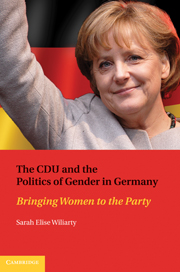Book contents
- Frontmatter
- Contents
- List of Figure and Tables
- Acknowledgments
- The CDU and the Politics of Gender in Germany
- Introduction: A Democratic Paradox?
- 1 The Puzzle of CDU Policy Making on Women's Issues
- 2 The Corporatist Catch-All Party Model
- 3 The Postwar CDU: Origins of a Corporatist Catch-All Party
- 4 The Emergence of the Women's Union, 1969–1982
- 5 The Women's Union in the Dominant Coalition, 1982–1989
- 6 Looking Eastward: The Women's Union and Cobbled Coalitions, 1989–1998
- 7 The Rise of Angela Merkel: Policy and Personnel Decisions of the CDU in Unified Germany
- 8 Christian Democracy With and Without Corporatism: Policy Making on Women's Issues in Austria, Italy, and the Netherlands
- 9 Conclusion
- Appendix: List of Cited Interviews
- List of References
- Index
8 - Christian Democracy With and Without Corporatism: Policy Making on Women's Issues in Austria, Italy, and the Netherlands
Published online by Cambridge University Press: 17 November 2010
- Frontmatter
- Contents
- List of Figure and Tables
- Acknowledgments
- The CDU and the Politics of Gender in Germany
- Introduction: A Democratic Paradox?
- 1 The Puzzle of CDU Policy Making on Women's Issues
- 2 The Corporatist Catch-All Party Model
- 3 The Postwar CDU: Origins of a Corporatist Catch-All Party
- 4 The Emergence of the Women's Union, 1969–1982
- 5 The Women's Union in the Dominant Coalition, 1982–1989
- 6 Looking Eastward: The Women's Union and Cobbled Coalitions, 1989–1998
- 7 The Rise of Angela Merkel: Policy and Personnel Decisions of the CDU in Unified Germany
- 8 Christian Democracy With and Without Corporatism: Policy Making on Women's Issues in Austria, Italy, and the Netherlands
- 9 Conclusion
- Appendix: List of Cited Interviews
- List of References
- Index
Summary
This book has argued that the German CDU's response to women was defined primarily by party organization and internal alliances. I tested this argument by pitting it against rival hypotheses in explaining CDU policies toward women over a thirty-year period. This chapter adds a comparison across countries to the comparisons across time and policy. Like the German CDU, Christian Democratic parties in Austria, the Netherlands and Italy have confronted new demands from women over the past thirty years. Like the German CDU, the Austrian People's Party (ÖVP) is a corporatist catch-all party in which women are represented. The Dutch Christian Democratic Party, the CDA, has only a weakly developed corporatist catch-all party structure. It is not as well developed as the CDU's or the ÖVP's. Furthermore, the women's organization of the CDA is a weak actor within the party without the power to select its own leadership. The Italian Christian Democratic Party can be regarded as a corporatist catch-all party because it did ensure representation of its internal factions. Despite some debate on the question, newer scholarship concludes that these factions were linked to policy directions. The Italian Party (the DC) had a women's organization, called the Women's Movement, but it was not a powerful player within the party.
As our central hypothesis would lead us to expect, the particular vision of Christian Democratic women has made substantially less headway in Italy and the Netherlands than it has in either Germany or Austria.
- Type
- Chapter
- Information
- The CDU and the Politics of Gender in GermanyBringing Women to the Party, pp. 185 - 217Publisher: Cambridge University PressPrint publication year: 2010



